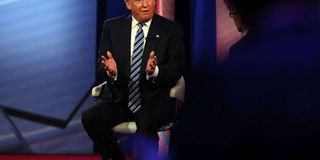US Republican presidential candidates face off in Nevada

Republican presidential candidate Donald Trump speaks at a CNN South Carolina Republican Presidential Town Hall with host Anderson Cooper on February 18, 2016 in Columbia, South Carolina. US Republican presidential candidates face off in Nevada on Tuesday. PHOTO | AFP
What you need to know:
- Trump, the billionaire real estate mogul whose name is lit up on a glitzy hotel on the Las Vegas strip, is the man to beat as he seeks a third straight win after New Hampshire and South Carolina, victories which cemented his status as the frontrunner.
- The latest CNN/ORC poll, released last week, shows Trump with 45 per cent support, followed by Senator Marco Rubio a distant second at 19 percent, and Senator Ted Cruz with 17 percent.
- Several of the candidates were making their final pushes to win over voters, holding town hall meetings and rallies, and canvassing neighbourhoods.
LAS VEGAS, Tuesday
US Republican presidential candidates face off in Nevada on Wednesday as frontrunner Donald Trump tries to maintain momentum with a rousing victory in the last contest before next week’s all-important “Super Tuesday” votes.
Trump, the billionaire real estate mogul whose name is lit up on a glitzy hotel on the Las Vegas strip, is the man to beat as he seeks a third straight win after New Hampshire and South Carolina, victories which cemented his status as the frontrunner.
The contest will be the fourth for the Republican presidential candidates after Iowa, where Trump came second, and those other two states.
But it will be their first in the US West and is a crucial part of the election cycle, with Nevada considered a swing state; its government is dominated by Republicans, but more Democrats are registered as voters.
In addition, the state has a significant Hispanic population of 27.8 per cent. And while they may not be the determining factor on Tuesday — most Hispanics in the state are believed to lean Democrat — they mark the largest bloc of Latino voters to date in the nominations race.
Mr Trump has consistently held a double-digit lead here.
The latest CNN/ORC poll, released last week, shows Trump with 45 per cent support, followed by Senator Marco Rubio a distant second at 19 percent, and Senator Ted Cruz with 17 percent.
The remaining two Republicans in the race, retired neurosurgeon Ben Carson and Ohio Governor John Kasich, earned seven percent and five per cent respectively.
MAKING FINAL PUSHES
It remained unclear whether Trump will reach such heights in Tuesday’s caucus in the Silver State: he has alienated many Hispanic voters with his persistent anti-immigrant rhetoric, and continues to clash bitterly with his Republican rivals.
Several of the candidates were making their final pushes to win over voters, holding town hall meetings and rallies, and canvassing neighbourhoods.
The field of Republican candidates, which once stood at more than a dozen, has been whittled down to five. Jeb Bush was the latest to pull out, on Saturday, following his poor showing in South Carolina.
Rubio and Cruz, both Cuban-Americans, stand to gain from Bush’s exit in Nevada, where he had backing from Republican Hispanic leaders.
However, the two candidates face a formidable foe in Trump, who barrelled to victory in South Carolina.
“He’s probably going to get about 35 percent of the vote, and it will be enough to win,” Eric Herzik, a political scientist at the University of Nevada, Reno, told USA Today.
Cruz finished third in South Carolina but noted Monday that he is the only candidate to have beaten Trump so far, in Iowa.
Cruz said there were only three viable candidates left in the Republican race, and “at this point here in Nevada, it’s all about turnout.”
On the Democrat front, Hillary Clinton notched a comfortable Nevada win Saturday over rival Bernie Sanders, a victory that breathed new life into her sluggish campaign.
WEEKEND WINS
Trump and Clinton’s weekend wins give them a major boost heading into the next crucial phase of the White House race — Super Tuesday on March 1, when about a dozen states go to the polls.
As the race tightens, candidates — especially on the Republican side — have increasingly engaged in mudslinging in one of the most entertaining and unpredictable primary seasons ever.
On the eve of the Nevada vote, Cruz fired his communications director over a false report about Rubio disparaging the Bible.
Rick Tyler had shared on Facebook a story from the University of Pennsylvania student newspaper, which reported that Rubio told a Cruz staffer reading the Bible that the holy book did “not have many answers in it.”
Tuesday’s Nevada vote takes place between 5:00 pm (0100 GMT Wednesday) and 9:00 pm, with the results expected shortly after caucuses close.
Contrary to primaries, caucuses allow participants to openly engage with one another and hear arguments from the candidates’ supporters or surrogates, in meetings at schools, community centers and churches.
Republicans then vote by secret ballot, in 130 caucus sites across Nevada.
The results will be used to determine the number of Republican delegates who represent the state at the party’s nominating convention in July.




